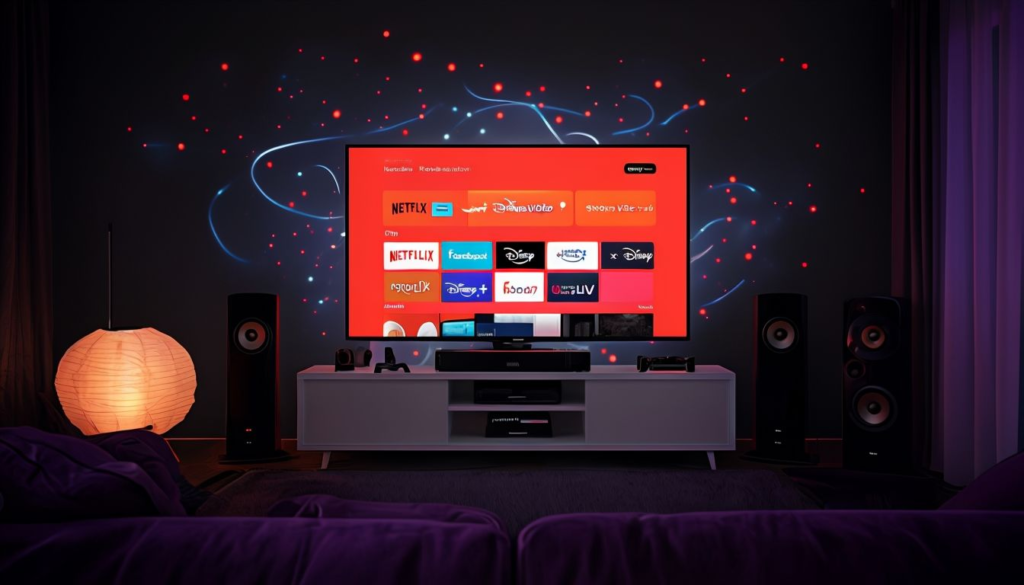Table of Contents
Ever been watching a show and then the buffering wheel starts? It’s really annoying and makes you wonder about your IPTV service. The truth is, IPTV buffering can really mess up our fun. But, knowing how to fix it can make your streaming smooth and uninterrupted.
With the right tips, you can say goodbye to buffering. We’ll look at why IPTV buffering happens and how to fix it. This includes tips for FireStick and Smart TVs. So, you can watch what you want without any trouble.
Key Takeaways
- IPTV buffering often results from slow internet speeds, network congestion, or hardware/software issues.
- The minimum required speed for IPTV streaming varies from 5Mbps for SD to over 50Mbps for 4K content.
- Utilizing a wired connection can significantly enhance stability and reduce buffering.
- VPNs can help bypass ISP throttling, enhancing your streaming experience and alleviating buffering problems.
- Regular troubleshooting of both hardware and software can mitigate ongoing IPTV buffering issues.
Understanding IPTV Buffering
IPTV buffering happens when video playback slows down because of internet speed issues. This can cause lag, freezing, or complete stops. It’s important to know about IPTV buffering for those who stream a lot.
What is IPTV Buffering?
Buffering is when video data is stored temporarily for smooth playback. If it’s not sent fast enough, the video pauses. This pause can be annoying, especially when you’re in the middle of watching something.
Common Causes of IPTV Buffering
Several things can cause IPTV buffering:
- Slow or unstable internet connections: Not enough internet speed means delays in getting data.
- Server congestion: Too many users on the IPTV server can cause big buffering problems, especially when it’s busy.
- Hardware or software issues: Old devices or apps might not handle streams well.
- Weak Wi-Fi signal strength: Being far from the router or having things in the way can mess up your connection.
- ISP restrictions: Some internet providers might slow down your connection or block IPTV traffic, making streaming hard.
To deal with these buffering problems, it’s key to know how to troubleshoot. Make sure you have the right gear, use the recommended internet speeds—like 5 Mbps for standard and 30 Mbps for 4K—and clear the app’s cache often. Roomtvs’ streaming tech helps reduce buffering, and using a VPN like ExpressVPN can get around ISP slowdowns.

Why Internet Speed Matters for IPTV Streaming
Knowing how internet speed affects IPTV streaming is key for a good viewing experience. Without enough bandwidth, users might see buffering and playback problems. These issues can ruin the fun of watching content.
Minimum Speed Requirements for Different Resolutions
Different video qualities need different internet speeds for smooth playback. Here are the minimum speeds needed for IPTV streaming:
| Video Quality | Minimum Speed for IPTV |
|---|---|
| Standard Definition (SD) | 5 Mbps |
| 720p HD | 10 Mbps |
| 1080p HD | 20 Mbps |
| 4K Ultra HD | 30 Mbps |
How to Test Your Internet Speed
It’s vital to meet or beat these minimum speeds to prevent streaming interruptions. If you’ve upgraded your internet but still see buffering, there might be other performance issues to check.
Testing your internet speed is easy to see if it’s good for IPTV. Tools like Speedtest.net let you test internet speed IPTV streaming quickly. Regular tests help keep an eye on your speed and spot any drops that could affect streaming.
Keeping your internet speed up is crucial for enjoying IPTV content fully. Whether it’s upgrading your connection or tweaking settings, knowing your speed and needs is key for a better streaming experience.
Tips to Improve Your Internet Connection
Boosting your internet connection can greatly cut down on IPTV buffering. This makes streaming much smoother. There are several ways to boost IPTV bandwidth, especially with wired and wireless connections.
Switch to a Wired Connection
Using an Ethernet cable for a wired connection is usually the best choice. It offers better speed and stability compared to Wi-Fi. Routers are often far from devices, causing weak signals. A wired connection helps avoid these problems and ensures top performance for IPTV streaming.
Optimize Your Wi-Fi Settings
If you’re using Wi-Fi, tweaking your settings is key. Here are some tips to boost your Wi-Fi and IPTV streaming quality:
- Place your router in the center of your home for better coverage.
- Use Wi-Fi extenders or repeaters to increase your network’s range, covering up to 2,800 square feet.
- Switch the Wi-Fi channel to cut down on interference from other networks.
- Keep an eye on your bandwidth use and disconnect unused devices.
- Get a modern router that supports both 2.4 GHz and 5 GHz frequencies for faster speeds.
By following these tips, you can greatly improve your internet connection and IPTV bandwidth. Choosing the right connection type can make your viewing experience much better.
Recommended Resources:
IPTV Buffering Troubleshooting Techniques
Watching IPTV can be frustrating when it buffers. There are ways to fix these issues. Keeping your IPTV device and apps in good shape is key for smooth viewing.
Restart Your Device
Restarting your IPTV device can solve buffering problems. It clears out temporary issues that cause streaming to stop. Rebooting your device and internet router is a common first step.
Make sure to restart for at least five minutes. This ensures all settings are refreshed. Using an Ethernet cable can also improve your connection and reduce buffering.
Clear App Cache and Data
If restarting doesn’t work, try clearing the app cache and data. IPTV apps collect temporary files that slow them down. Clearing this cache can improve streaming quality.
Look for cache management options in your settings. If problems continue, consider reinstalling the app. Keeping your app updated can also help fix buffering issues.
Using a VPN to Solve IPTV Buffering Issues
IPTV streaming can face many problems, like ISP throttling. Using a VPN for IPTV can make streaming better and safer. The right VPN can get past ISP throttling, giving users smooth streaming.
Bypass ISP Throttling
Internet Service Providers might slow down your connection if they see a lot of streaming. This can cause annoying buffering. A strong VPN for IPTV can help avoid this, letting you watch without breaks. With a good VPN, you can get the speed you need for your streaming:
| Resolution Quality | Minimum Speed Required |
|---|---|
| Standard Quality (SD) | 5 Mbps |
| 720p HD | 10 Mbps |
| 1080p HD | 20 Mbps |
| 4K Quality | 30 Mbps |
Selecting the Right VPN for IPTV
Picking the right VPN is key for a smooth IPTV experience. Services like ExpressVPN are great for keeping speeds steady. They are fast and keep your online activity private. Important things to look for include:
- Connection speed and reliability
- Encryption protocols for safety
- Server locations close to IPTV service providers
ExpressVPN offers a big discount on their annual plan and three extra months for free. They also have a 30-day money-back guarantee. This lets users try it out without risk.
Using a premium VPN can solve buffering problems and make streaming smooth. It not only makes watching better but also keeps your identity safe online.
Recommended Resources:
Choosing the Right IPTV Service Provider
Finding the right IPTV provider is key to a smooth streaming experience. The provider’s server setup greatly affects streaming quality, especially when many users are online. Providers with strong servers can handle lots of users without buffering.
When picking an IPTV provider, look at server reliability and customer support. These factors are crucial for a good experience.
Importance of Server Infrastructure
Server infrastructure is essential for uninterrupted streaming. A good setup means the provider can handle lots of users without slowing down. For example, GUEKHDIPTV has over 110,000 live TV channels and a strong server to keep streaming smooth.
On the other hand, services with poor servers often cause buffering. This can make users unhappy and want to switch.
Customer Support and Server Status
Good customer support makes a big difference. Reliable service should fix problems quickly, making the experience better. It’s important to check the provider’s reputation for server status and support.
If you still face buffering issues, even with a good internet connection, it might be time to look elsewhere. Providers like Fubo IPTV and TiVistation offer many channels and quick customer service, making users happy.
Adjusting IPTV App Settings for Smooth Streaming
Improving your IPTV streaming can be done by tweaking the app settings. Making small changes can make a big difference, especially when dealing with buffering. Start with basic tweaks to enjoy smoother playback.
Lowering Video Resolution
One good way to improve streaming by adjusting settings is to lower the video resolution. Streaming in standard definition uses less bandwidth than HD. If you’re seeing lag, try lowering the resolution to 720p from 1080p. This can make your streaming smoother.
Increasing Buffer Size
Increasing the buffer size in your IPTV app settings is another option. A bigger buffer stores more data, helping with internet speed changes. This can cut down on buffering. Try different settings to find what works best with your internet.
Hardware and Software Optimization for IPTV Devices
To get the most out of IPTV, you need to improve your hardware and keep your software up to date. Making sure your IPTV hardware is top-notch helps you stream without any hiccups. Also, updating your IPTV apps regularly can make them work better and cut down on buffering. By doing these simple things, you’ll always have the best viewing experience.
Regularly Update Devices and Apps
It’s crucial to keep your IPTV apps updated to avoid problems. Updates often fix bugs and make streaming smoother. If your apps are old, they might have trouble connecting, causing annoying breaks. Always look for the newest versions to keep your apps running smoothly.
Use Appropriate Equipment for Streaming
Choosing the right devices for IPTV can really improve your streaming. Devices like Amazon Fire Stick and Roku are made for high-definition content. They work well and perform well.
Also, getting a router with Wi-Fi 6 technology can make your IPTV hardware better. These routers give you better coverage and faster speeds, making streaming smooth. For an even more stable connection, try using Ethernet cables. They’re great for IPTV streaming because they’re reliable.
Conclusion
To fix IPTV buffering, you need a detailed plan. First, check your internet speed. It should be enough for HD or 4K streaming. For HD, 5-10 Mbps is good. But for 4K, you’ll need 25 Mbps or more.
If your speed is too low, getting a faster connection can help a lot. Using a wired Ethernet connection is usually better than Wi-Fi. It makes your streaming smoother.
Also, tweak your IPTV settings to boost performance. Adjust the buffer size and turn on hardware acceleration. Keeping your device and IPTV app updated is key. If problems persist, ask your IPTV provider for help.
By following these steps, you can enjoy your shows without interruptions. Services like AwkngTV.com or tools like PureVPN can also help. They fight against ISP throttling, making your streaming experience better.


16 thoughts on “Fix IPTV Buffering Issues – Smooth Streaming Ahead”